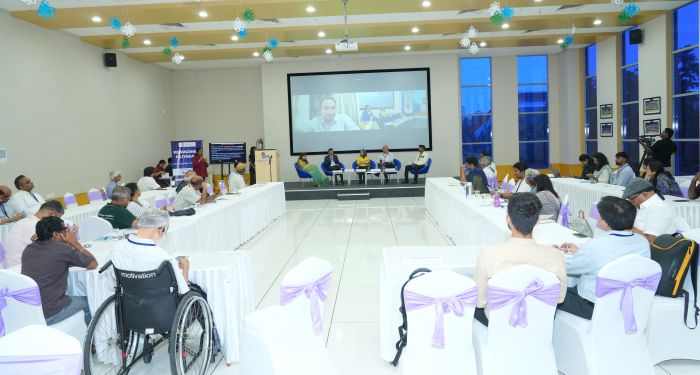
A two-day multi-stakeholder consultation on “Re-Imagining Pathways for Assistive Technology” at the International Institute of Information Technology Bangalore (IIIT-B) united policymakers, corporates, startups, academia, civil society, and persons with disabilities to forge innovative, inclusive AT solutions for India. This event organized by The National Centre for Promotion of Employment for Disabled People (NCPEDP), in partnership with Mphasis F1 Foundation and IIIT-B’s Centre for Accessibility in the Global South (CAGS), showcased thought leadership and action in the AT sector.
A key highlight was NCPEDP’s presentation of a comprehensive policy paper on India’s AT landscape, along with panel discussions, a roundtable, and startup pitches focused on scalable, inclusive solutions.
A multistakeholder roundtable explored innovative financing models—ranging from government subsidies and insurance coverage to ESG-aligned venture capital investments. A three-tiered framework was proposed, linking the innovation ecosystem, lived experience of persons with disabilities, and the market ecosystem to create meaningful policy impact. Speakers highlighted the widespread lack of awareness and called for urgent investment in information access, data systems, and inclusive infrastructure.
Reflecting on the vision behind the initiative, Prof. Amit Prakash, Professor and Convener of CAGS at IIIT-Bangalore, stated, “At CAGS–IIIT Bangalore, we are committed to fostering an ecosystem where policy, technology, and lived experiences intersect to create solutions that are not only accessible but also equitable. This consultation reflects our belief that true impact lies in co-creation—with persons with disabilities as central contributors in shaping the future of AT.”
The final day of the consultation spotlighted innovative startup pitches presenting cutting-edge assistive technology (AT) solutions. A distinguished jury from NCPEDP, ICMR, IvyCap Ventures, Mphasis, IIIT-Bangalore, and STPI evaluated the pitches, awarding the NCPEDP-Mphasis AT Hub Seed Grant to seven promising startups, providing them with crucial seed funding to scale their impactful solutions. The pitch day showcased cutting-edge assistive technology solutions, evaluated by an esteemed jury: Pradeep Gupta, Chairman of Cyber Media Group and Chairman, NCPEDP; Anju Gupta, President of IvyCamp; Sumit Chauhan- Head, Corporate Social Responsibility, Mphasis; Darshitha Niranjan, Senior Manager, Corporate Social Responsibility, Mphasis; Prof. Amit Prakash, Convener of CAGS at IIIT-Bangalore; Dr. Nishant Peddagopu, COO of Software Technology Park of India, Bangalore; and Dr. Ravinder Singh, Senior Scientist at ICMR.
The following innovators won grants from the investors:
Subtlebotic Private Limited: Wearable neuro-motor robotic system enhancing mobility for individuals with physical disabilities.
Aumeesh Tech Pvt Ltd: Cost-effective, lightweight mechanical orthotic device aiding those with spinal injuries and gait issues.
Exobot Dynamics Pvt Ltd: Lightweight, affordable bionic hand designed for arm amputees.
Curacraft Designs Pvt. Ltd.: High-activity prosthetic foot tailored for Indian transtibial amputees.
Lifespark Technologies Private Limited: Wearable mobility aid reducing gait issues and falls for Parkinson’s patients.
Akumen Artificial Intelligence Pvt Ltd: Affordable AI-powered solutions for the visually impaired.
Grailmaker Innovations Private Limited: Web-based platform enabling home-based therapy for cerebral visual impairment.
Speaking at the event, Mr. Pradeep Gupta, Chairperson of NCPEDP, emphasized “India’s Assistive Technology ecosystem holds immense potential to transform lives and livelihoods—but realizing this potential requires a vibrant startup ecosystem supported by enabling policies, academic collaboration, and active participation from incubators. At NCPEDP, we believe the time is ripe for the emergence of dedicated AT hubs across the country. Through collaborative efforts, we can unlock this market and ensure AT becomes a catalyst for inclusive growth.”
Panel discussions explored key challenges in the assistive technology value chain, including import dependency, high production costs, and limited access. Experts emphasized the need for local AT manufacturing, policy support, subsidies, CSR initiatives, and integration into healthcare. They also highlighted how AT can promote inclusive education, workforce inclusion, skilling, and independent living for persons with disabilities.
Earlier, Mr. Arman Ali, Executive Director, NCPEDP, in his welcome address remarked, “At NCPEDP, we envision a future where inclusive design is not an afterthought but a foundational principle of technological innovation. This consultation is a testament to the power of interdisciplinary collaboration—bringing together technologists, researchers, and persons with disabilities to co-create solutions that are accessible by default.”







